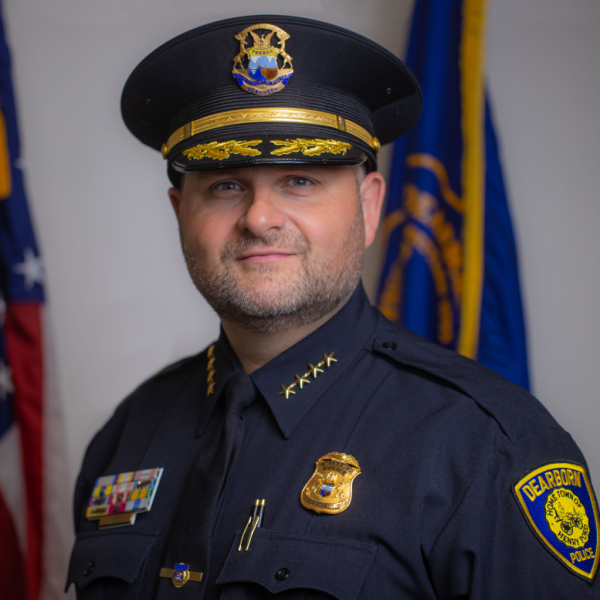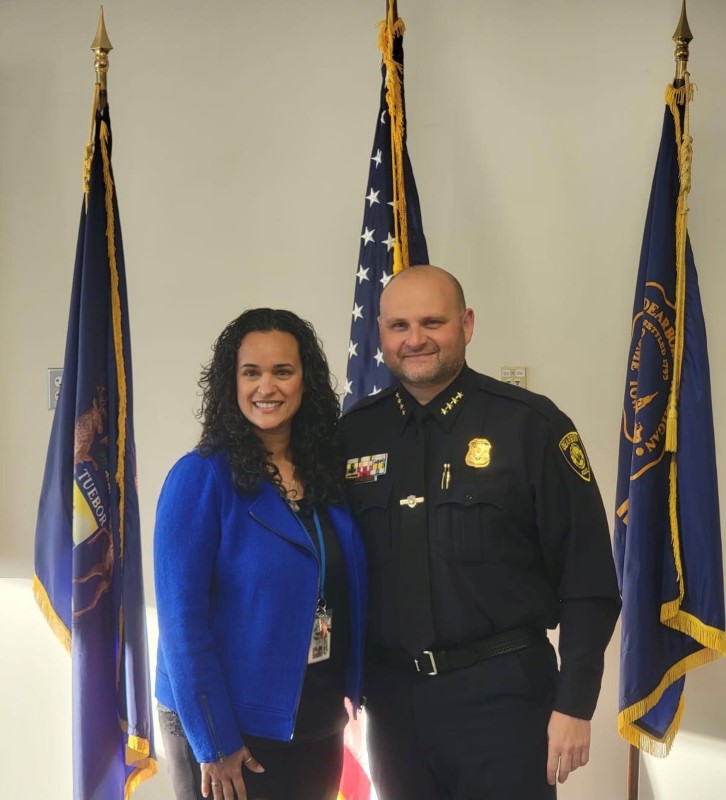
Issa Shahin, Eastern Michigan ’93, Honored for Transforming Community Policing in Dearborn
Written by
Elizabeth Allouche
Published on
April 25, 2025
Updated on
September 2, 2025
Issa Shahin, Eastern Michigan ’93, was recently recognized with a Racial and Social Justice Award from the Michigan Roundtable—a powerful full-circle moment in a career dedicated to fairness, public safety, and reform. As the first Muslim American police chief in Michigan and one of only a handful across the nation, Issa is not only making history—he’s reshaping it.

Born and raised in Ann Arbor to an Egyptian father and Albanian mother, Issa grew up surrounded by stories of resilience. His maternal grandparents fled communism in Albania, and his father's journey from Cairo to Michigan left a lasting impact. Those roots would eventually pull him across the world during his college years to study at the American University in Cairo.
“It wasn’t your traditional college experience,” Issa said. “But being able to sit in the same window my dad did as a child, to hear the call to prayer from the mosque across the street—it was something you can’t put a price tag on.”
He credits his mother for instilling the belief that education and experience are two things no one can take away, and his time abroad broadened his perspective while deepening his connection to family and faith.

Back at Eastern Michigan, Issa joined the Gamma Tau Chapter of Delta Sigma Phi his freshman year. “The fraternity gave me leadership experience and helped me find friends in a brand-new environment,” he said. “That network is something I still value.”
Though he initially planned to pursue law school, Issa decided that wasn’t quite the right fit for him. Still, Issa felt a growing pull toward public service—and in 1998, he joined the Dearborn Police Department. Over the next two decades, he worked his way up through the ranks, navigating challenges with a deep sense of purpose.
“I didn’t grow up thinking I wanted to be a cop,” he said. “I wanted to do international work — to be an ambassador or work in the Foreign Service. But as I started to think about what I valued and how I could make an impact, I realized I cared deeply about public service. Law enforcement ended up being a vehicle for that.”

Today, Issa serves as Chief of Police in Dearborn, Michigan — a diverse community on the western edge of Detroit with a large Arab-American population and a complex history of civil rights and community-police relations. A first-generation Egyptian-American, Issa has spent nearly three decades with the department. He joined at 24, after graduating with a degree in Political Science and Middle East & North African Studies. He worked his way through patrol, community policing, ATF Task Force Officer, and internal affairs before rising into leadership roles, eventually becoming chief in 2022.
One of his first priorities was ending outdated and problematic enforcement strategies—particularly those that disproportionately impacted people of color. “No one ever called my office to complain about dangling ornaments,” he said. “But they do call about reckless driving and speeding through neighborhoods. So that’s what we focus on now.”
Under his leadership, traffic stops for minor infractions were deprioritized in favor of violations that actually affect safety. The result? A dramatic decrease in racial disparities and an increase in community trust. Issa also launched a public-facing transparency dashboard to share real-time policing data—part of his belief that policing must be accountable and reflect the people it serves.
Throughout his career, Issa has leaned on diplomacy and dialogue—even in the toughest moments.
“In 2022, we had an armed individual enter our station and attempt to fire at one of our officers. It was an incredibly tense and dangerous situation,” Issa said. “We made the decision to release the full video from the lobby because transparency matters. We knew people would have questions, and the only way to build trust is to face those questions head-on—with consistency and honesty."
As chief, he’s focused on strengthening that trust. Dearborn’s department has become known for its community outreach efforts, data transparency, and responsiveness to public concerns. But Issa doesn’t pretend that trust is permanent.
“You don’t inherit trust,” he said. “You earn it, and you keep earning it every single day.”
For Issa, leadership isn’t about holding a title — it’s about showing up, listening closely, and leading with integrity. His journey from the son of immigrants to police chief of one of America’s most diverse cities reflects a career shaped by empathy, accountability, and a global perspective. Whether mentoring young people exploring public service or reimagining what community policing can look like, Issa is proving that lasting change starts with the willingness to do things differently — and the courage to keep earning the community’s trust, one decision at a time.